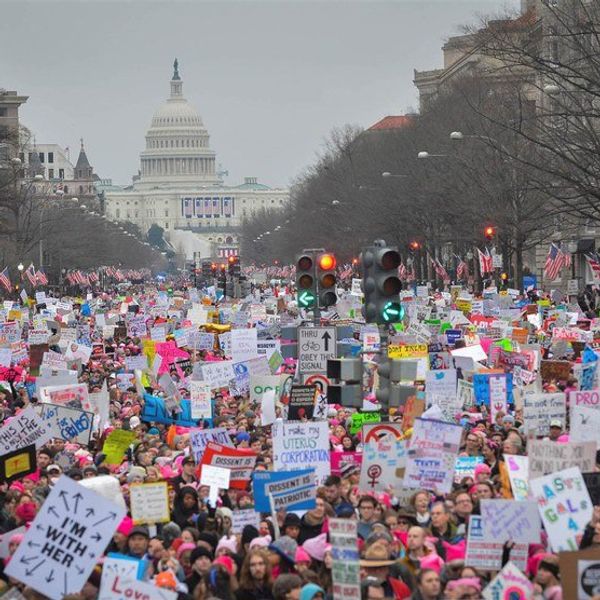With the internet-celebrations of International Women’s Day taking place this past week, it is saddening to see all the women-happy energy and empowering messages slowly fade from newsfeeds. I.W.D. was held on March 8 and inspired people across the globe to raise awareness about gender inequality-- a.k.a. the view that women and men have equal value and should be afforded equal treatment-- in all of its forms. From leadership positions to agriculture, to political representation to the gender wage gap, there is not a single country where women and men have reached full equality. Making space in the year for I.W.D. and Women’s History Month is the least we can do to jump-start change. Since we have the rest of March to keep feminist conversation in high-gear, here are five #hashtags to keep up with and share during the course of the month. (And remember, it doesn’t end there! Social media is obviously not enough to make real, lasting change. But, it sure does get the ball rolling.)
#HB2
On March 2, the Supreme Court heard Whole Woman’s Health vs. Hellerstedt, which is a challenge to Texas’s HB2-- a bill that essentially over regulates abortion providers into non-existence. The state had about 41 clinics before HB2, and now has 18. Arguably the most important abortion case of our generation, Justices Ruth Bader Ginsburg, Sonia Sotomayor, and Elana Kagan have been fighting tooth and nail to dismantle the Texas anti-choice law and protect women’s right to choose.
Women and men alike should do their best keep up with this potential catastrophe to reproductive freedom and abortion access, since more states are likely to adopt similar policies if HB2 stays in place. #StopTheSham has also been being used to spread information on the convoluted history of abortion access in the United States, as well as shine a light on the societal stigmas abortion patients are forced to endure.
#HeForShe
This widely known movement part of United Nation Women began in 2014 to help create a gender equal world. According to HeForShe's website, the organization has impacted almost 2 million “equality actions” across the globe and focuses on multiple areas of gender disparity, like health, education, identity, work, and politics. The group’s newest initiative this month, HeForShe Arts Week, seeks to “leverage the arts for gender equality.” (They got their own emoji on International Women’s Day!) Emma Watson, actress and Global Goodwill Ambassador for U.N. Women, has spoken out for gender equality for several years and is one of the leading faces for the organization. “The more I’ve spoken about feminism the more I’ve realized that fighting for women’s rights has too often become synonymous with man-hating,” Watson said in her 2014 speech at the U.N. “If there is one thing I know for certain, it is that this has to stop.”
#Planet5050
United Nations Women made the theme of International Women’s Day “Planet 50-50 by 2030: Step It Up for Gender Equality.” The movement is to build further momentum for their Sustainable Development Goals, commitments under UN Women’s “Step It Up” initiative, and their existing commitments on gender equality, women’s empowerment and women’s human rights. “We must not leave anyone behind. We must not leave behind those who are willing and able to serve their countries, to serve their universities, to serve their churches, to serve their companies, and to serve the United Nations,” UN Women's Executive Director, Phumzile Mlambo-Ngcuka, said in her opening remarks in New York on March 8. The organization took bold action on social media the past week and are continuing to push their goal of reaching full gender equality across the globe.
#ReproRight
It’s no secret-- women’s reproductive rights are at high risk during this election season. Just about every candidate has voiced their opinion on abortion, not to mention the conservative majority in the Supreme Court poses a major threat to rights set forth from Roe v. Wade. The next president has a huge amount of power when it comes to reproductive health care. Long story short: know your candidate’s view on women’s right to choose.
#RestoreTheVRA
This hashtag briefly started trending a couple of days after International Women's Day, and deserves much more spotlight on social media. The Voting Rights Act of 1965 honors civil rights heroes Fannie Lou Hamer, Rosa Parks, and Coretta Scott King and it is not up to be reauthorized until 2031. It has consistently passed through Congress with strong bipartisan support, President George W. Bush being the last president to reauthorize the bill. However, states such as Alabama, Georgia, Tennessee, Texas and Virginia have passed laws ranging from voters having to present photo ID at the polls, to requiring proof of citizenship when registering to vote that disproportionately affect minority voters, such as people of color, women, transgendered people, and those living in poverty. The history of these laws are long and complicated, after a 2013 Supreme Court decision that took away the Justice Department’s authority to clear law provisions made by states, but these new restrictions could potentially have major consequences on upcoming election results.
“This is the first presidential election in the more than 50 years of the Voting Rights Act that the department’s ability to enforce the act has been so severely cut back,” said Vanita Gupta, head of the Justice Department’s civil rights division, in the Washington Post. Grassroots level actions have taken place to ensure every eligible citizens have the right to cast a ballot on election day.
What else will you be doing to celebrate this women's month?
























